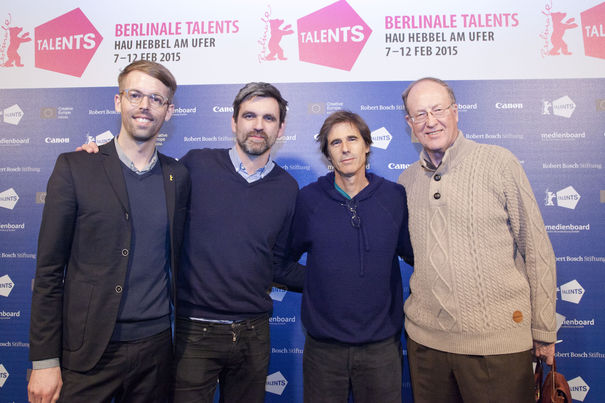FINDING THE SELF IN SPACE AND FORM
By Alonso Díaz de la Vega

Directors Walter Salles and Sebastian Schipper discussed road movies, moderated by Peter Cowie.
“The first road movies are documentaries like NANOOK OF THE NORTH,” said Brazilian director Walter Salles during the Berlinale Talents masterclass “Road, Movie: Films in Motion”. This genre, which sends its characters searching for meaning within a landscape, has existed since the early days of cinema as an offshoot of documentaries and as a response to national crises. Jean-Luc Godard, he reminded the audience, said that “good documentaries drift toward fiction”. He also stated that the character, Philip Winter in Wim Wenders’ road movies, reflects the identity conflicts in postwar Germany as much as the deranged soldiers in “boat movie” APOCALYPSE NOW mirror the state of American society during the Vietnam War.
Salles was joined onstage at the Theater Hebbel am Ufer by moderator and renowned film critic Peter Cowie and German director Sebastian Schipper. They spoke about the significance and the production of road movies, including Schipper’s latest film, VICTORIA (Germany). Although not part of the genre in the traditional sense—since the journey all takes place within Berlin—this film, made in a single 140 minute long take, much praised by Cowie, is an odyssey nevertheless. The music, said the British film critic, plays an integral role in the film. Schipper added that scores and soundtracks take the audience into the inner worlds of the characters. For that reason, he asked composer Nils Frahm to “create silence” for VICTORIA. Salles, on the other hand, claimed to show only the scripts of his projects to composer Gustavo Santaolalla, not the finished films.
Space, the Berlinale Talents 2015 theme, was also part of the discussion, with Salles reflecting on one of his favorite aspects of Chinese director Jia Zhang-ke’s works: his sense of geography. In honor of Jia’s THE WORLD, shot in a theme park with smaller replicas of landmark buildings from all over the world, Salles interviewed him there for his documentary JIA ZHANG-KE, A GUY FROM FENYANG (JIA ZHANG-KE, UM HOMEM DE FENYANG, Brazil). The place, said Salles, is “an implosion of time and space”, much like the imagination of the men behind cinematic odysseys, whose characters transcend their contexts to find the boundless confines of their souls.

